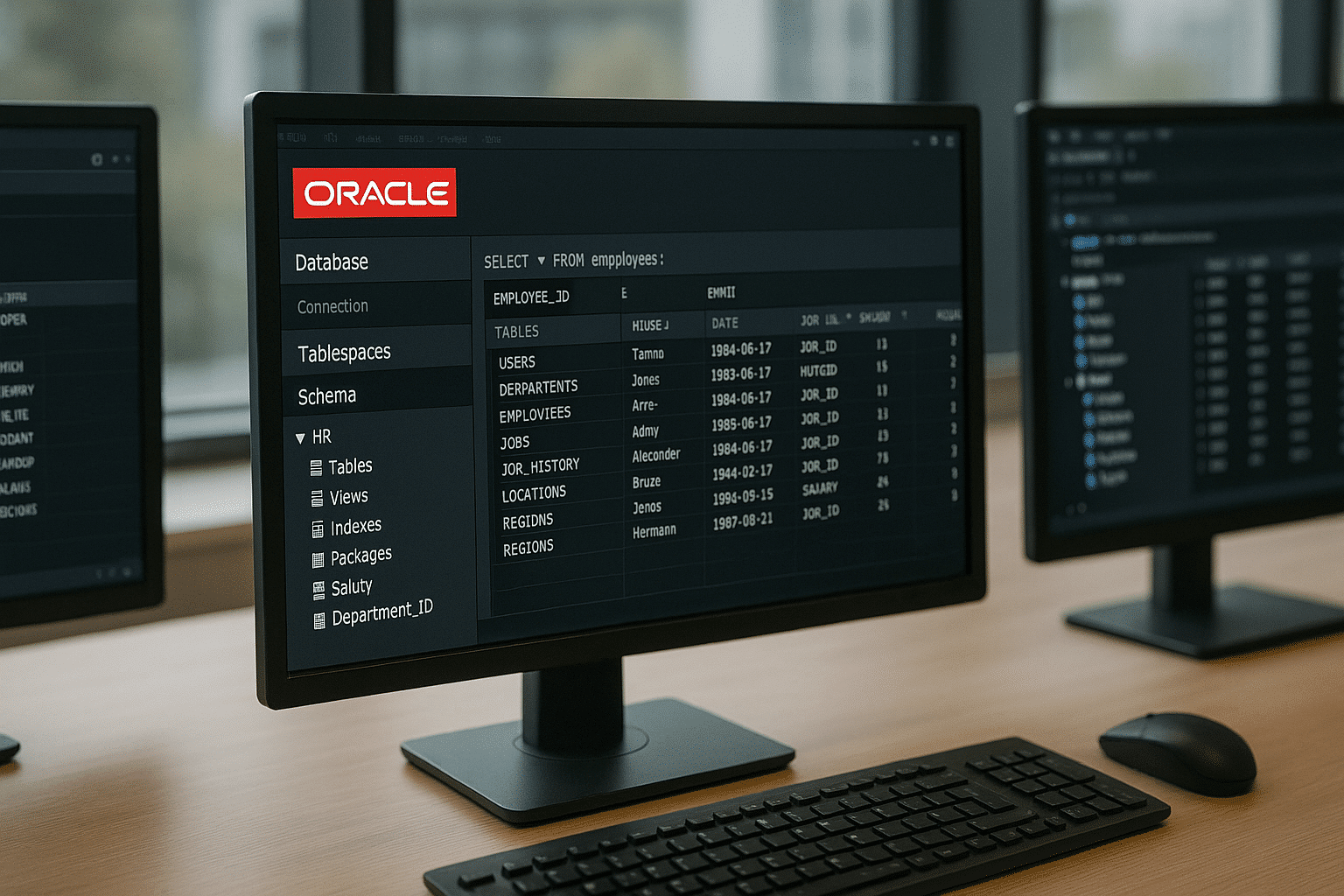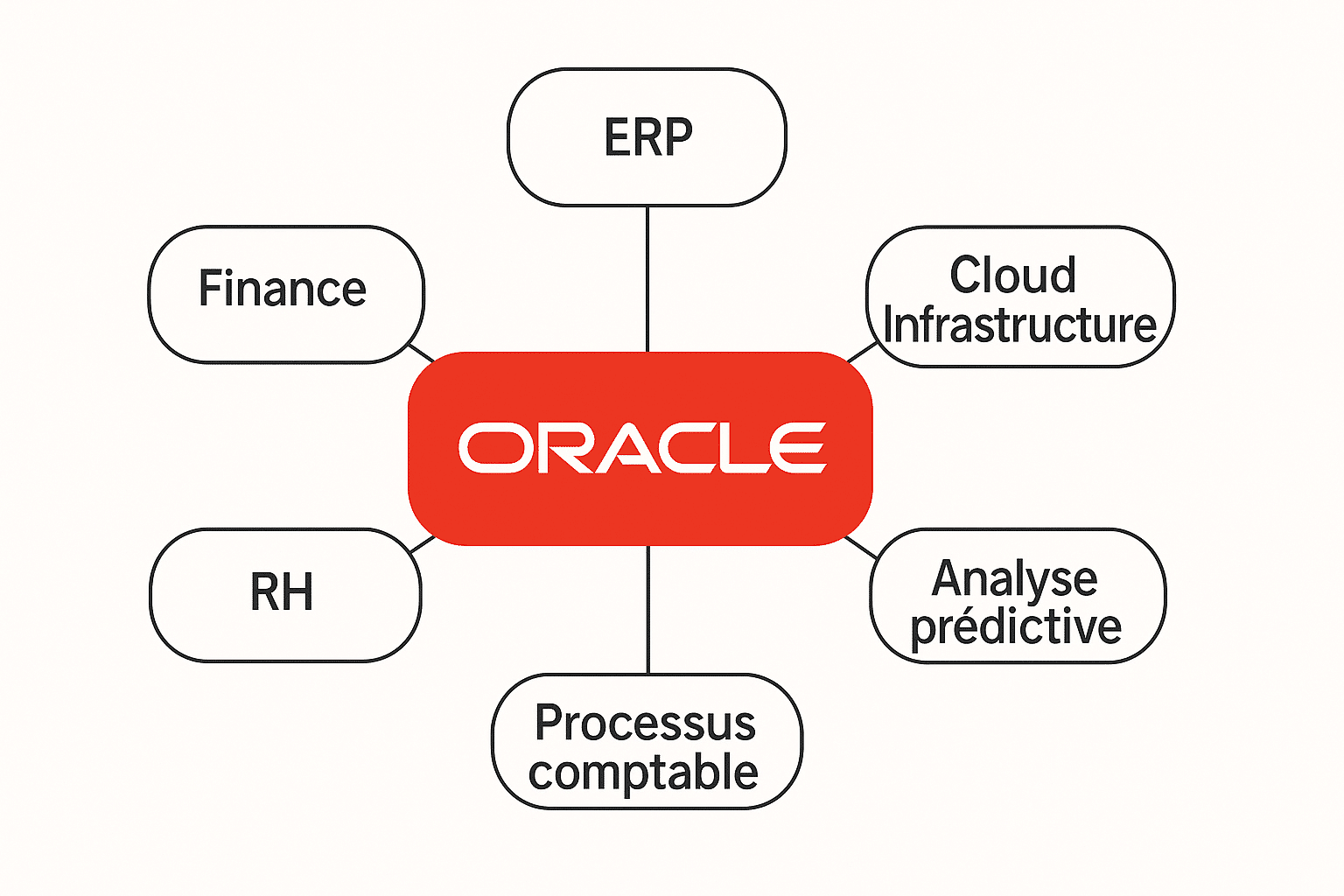Oracle has solidified its position as a cornerstone of enterprise computing. From its renowned database to its cloud and AI solutions, Oracle continues to innovate and facilitate the digital transformation of organizations. Discover why mastering the Oracle ecosystem will be a significant asset in 2025.
Oracle: A Key Player in Global IT
You’ve likely heard of Oracle, though you may not be familiar with everything behind this iconic name. Established in 1977 by Larry Ellison, Oracle Corporation has become a global leader in databases and enterprise technologies. Initially called Software Development Laboratories, the company rebranded to Oracle Systems and eventually Oracle Corporation.
Over the past 40 years, Oracle has continuously innovated and expanded its technological dominance. Through targeted acquisitions and a keen sense of anticipating business needs, Oracle has successfully penetrated all sectors, from healthcare and finance to industry and retail.
By 2024, its revenue surpassed $14 billion per quarter, primarily driven by its cloud services. Its market capitalization nears $430 billion, positioning it as a pillar of the global digital landscape.
Oracle’s influence is underscored by critical technological advancements. As early as the 1980s, Oracle offered a portable database compatible with various machines. Later, it integrated Java by acquiring Sun Microsystems and bolstered its cyberhealth presence through the acquisition of Cerner. These milestones demonstrate Oracle’s ability to remain at the forefront year after year.
With this understanding of Oracle’s foundation, let’s delve into what makes its flagship product, Oracle Database, globally renowned.

Oracle Database
What Is Oracle Database?
Oracle Database is a relational database management system (RDBMS) designed to store, organize, and secure vast amounts of data.
Utilized by thousands of companies worldwide, it is celebrated for its reliability, robustness, and ability to meet the critical needs of modern organizations. Whether you are a small or medium-sized business or a large corporation, Oracle Database allows you to manage your data with precision while remaining scalable.
Key Features and Benefits
Here is what Oracle Database offers on a daily basis:
- Exceptional Portability: Deploys across hundreds of systems, adapting to your existing infrastructure.
- High Availability: Ensures data accessibility even during failures.
- Enhanced Security: Features encryption, anonymization, and comprehensive rights management.
- Optimized Performance: Maintains fast queries even with millions of records.
- Multibase Management: Hosts multiple databases with a single installation without efficiency loss.
- Advanced Backup: Provides data recovery to specific incident points.
- Intelligent Automation: Features Oracle Autonomous Database, making it nearly self-managing.
Use Cases in Businesses
Wondering when Oracle Database is truly beneficial? Here’s a concise overview:
| Sector | Use |
|---|---|
| Finance | Transaction tracking, fraud detection, regulatory compliance |
| Healthcare | Patient record management, medical data security |
| E-commerce | Inventory management, offer personalization, order processing |
| Industry | Production tracking, predictive maintenance, logistics planning |
| Public Sector | Citizen data management, archiving, IT security |
Additional Oracle Solutions
ERP, Cloud, Analytics Software, AI...
Exploring Oracle reveals a world beyond databases. The company now offers a comprehensive software suite designed to address the practical needs of modern organizations. You’ll find powerful ERP systems capable of automating accounting or HR processes, adaptable cloud solutions, and predictive analytics software and tools integrated with artificial intelligence, ready to transform your data streams into decision-making levers. Although these technologies may appear complex initially, they are crafted to help you save time, enhance precision, and most importantly, boost your business visibility. By choosing Oracle, you engage with an integrated, robust ecosystem poised to grow alongside you.
Oracle Cloud Infrastructure (OCI) vs AWS / Azure
You’ve likely heard of AWS or Azure, but perhaps less about OCI. However, Oracle Cloud Infrastructure is an efficient, competitive alternative increasingly preferred by large enterprises. While competitors might complicate choices with numerous options, Oracle emphasizes simplicity, consistency, and cost management. In terms of speed, security, and integration with its tools, OCI proves to be exceptional. If you seek to balance reliability, performance, and innovation without escalating costs, it’s a solution worth exploring.
Who Can Benefit from Oracle Products?
You may question if Oracle tools suit your needs. The answer is straightforward: yes, if you work with data, be it for storage, analysis, or security. Whether you are a data analyst, project manager, system administrator, developer, or even an SME executive, you’ll find Oracle’s offerings to be a solution tailored to your skill level and requirements. The wide-ranging functionalities of these solutions should not intimidate you; they are designed to aid skill development while maintaining user-friendliness. If you aim to enhance your digital practices professionally, Oracle provides a solid, sustainable, and well-regarded foundation across all sectors.

Why Learn to Use Oracle in 2025?
By 2025, learning Oracle means choosing relevance, durability, and employability. Relational databases are not vanishing; rather, they are evolving, becoming richer, and continue to drive the core systems of major corporations. Training in Oracle equips you with a highly sought-after expertise, valuable for both technical positions and roles focusing on management or strategy.
Oracle isn’t merely a static realm of knowledge. It’s a dynamic environment evolving with artificial intelligence, data analysis, and the cloud. Essentially, you aren’t just learning software; you’re gaining insight into how modern systems operate and how to leverage them to enhance your projects, processes, or career.
By commencing your training now, you obtain a competitive advantage. You become more independent, more credible to employers or partners, and significantly, more flexible in your technological decisions. That is genuine empowerment.
Conclusion
Oracle is not merely a historical publisher; it plays a pivotal role in shaping the future of digital technology. By combining robustness, innovation, and industry expertise, its ecosystem has become a benchmark for businesses of all sizes. In 2025, mastering Oracle means equipping yourself to better comprehend modern information systems, strategically capitalize on them, and participate in digital transformation. It represents a wise investment, both for your career and your projects.










